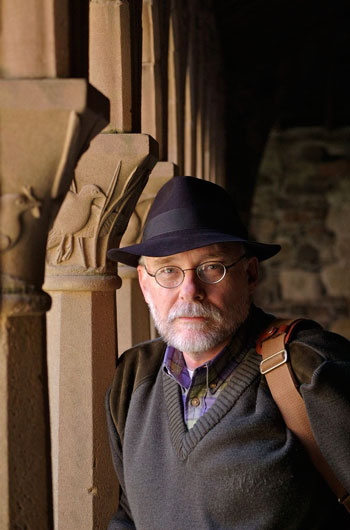Amid the red tomatoes and pale yellow ears of corn at the county fair, Jim Richardson, National Geographic photographer, won his first photography award: a blue ribbon and 75 cents.
“Seeing the judge come down the line, get to the photography section and, hearing the accolades that she had for my use of creative framing, and use of silhouettes, and giving me the blue ribbon,” Richardson said. “Then of course, after that, she went on to judge the big tomatoes and the ears of corn. But it was enough for me to have somebody say I was doing a good job.”
Richardson will share with Chautauquans the all-encompassing importance of protecting the night sky at 10:45 a.m. Monday, Aug. 1 on the Amphitheater stage through his lecture, “The End of Night.” He was integral in the genesis and completion of the National Geographic story “The End of Night: Why We Need Darkness,” and he will draw from this cover story to begin Week Six at Chautauqua, “After Dark: The World of Nighttime.”

Richardson began photography through the example of his father, and spent summers photographing life on their Kansas farm — their dog, ducks in the pond and cows in the pasture. He experimented with photography, shooting from underneath microscope lenses and through telescopes. His Uncle Bob, who lived in a one-room shed next to a gas station, was an amateur telescope builder.
“He was grinding mirrors for telescopes,” Richardson said. “He made his first telescope, and he showed me Saturn. When you see Saturn for the first time through a telescope, it’s pretty amazing. It’s really there, you know, all those rings and all.”
On warm summer nights, he and his cousins would spread quilts across their front yard “and wait, hoping it didn’t rain underneath the Milky Way,” Richardson said.
These experiences solidified his desire to be involved with astronomy, and he began his career as a self-described “armchair astronomer.” He has traveled all over the world photographing the night sky. He has trekked out to the famed sandstone arches of Arches National Park at 3 a.m., caught the Milky Way rising above them, and he has seen the galaxy upside down from the Southern hemisphere at Easter Island.
While he has photographed much of his Kansas home, the time spent traveling and collecting photos for the NatGeo story, “The End of Night,” is a part of his career that Richardson is most proud of.
“I continue, and have continued, to take every opportunity, when they were presented, to do more Milky Way pictures in far—flung locations. But, it was really (a) very intensive time of trying to find ways of showing what was going on — both showing the wonders and the splendor of it, and showing what was being lost,” he said.
Richardson realizes that not everyone had the formative experiences of his childhood and adulthood. He also recognizes that for people to become motivated to protect the night sky, they have to understand why it is important.
He cited leatherback turtles hatching their eggs on beaches. The baby turtles emerge at night and become confused by lights on the beaches, moving toward those, and inevitable death, instead of toward the moon and ocean. Fireflies are also harmed by light pollution, as the males fly in the air, blinking as a mating signal to the females on the ground. If light pollution bars this communication, firefly populations will suffer.
More locally, through the Dark Sky Initiative, Chautauqua encourages people to learn about light pollution and implements change, working with the Dark Sky Association to be recognized as a dark sky community. This same association has honored Richardson with, in his opinion, the coolest title he’s received: Dark Sky Defender.
Richardson will continue to cultivate understanding with Chautauquans by sharing information on, “prosaic things as street lighting and how various kinds of street lights affect the night, and how population growth affects it, and how it spreads, and how it obliterates dark skies … and understanding which species are affected.”
Before leaving the Amp stage, Richardson wants to instill in Chautauquans a sense of marvel at the human relationship with darkness.
“That’s what I hope to be able to offer specifically, is more understanding, perspective,” he said, “and a sense of the wonder, both the wonder that is being lost and the wonder at our excesses, our human excesses, that threaten to take away this great gift — this great heritage — to take it away from us without us ever quite noticing.”




